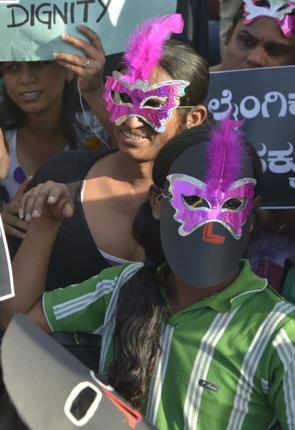New Delhi, December 11: In a major setback to gay activists, the Supreme Court on Wednesday held that homosexuality or unnatural sex between two consenting adults under Section 377 of the Indian Penal Code is illegal and will continue to be an offence. This provision did not suffer from any constitutional infirmity, it said.
A Bench of Justices G.S. Singhvi and S.J. Mukhopadaya set aside the Delhi High Court’s verdict decriminalising homosexuality under Section 377.
The Section holds that whoever voluntarily has carnal intercourse against the order of nature with any man, woman or animal commits unnatural offence.
The Bench said: “We hold that Section 377 does not suffer from… unconstitutionality and the declaration made by the Division Bench of the High Court is legally unsustainable.” It, however, said: “Notwithstanding this verdict, the competent legislature shall be free to consider the desirability and propriety of deleting Section 377 from the statute book or amend it as per the suggestion made by Attorney-General G.E. Vahanvati.”
Writing the judgment, Justice Singhvi (who retired on Wednesday) said: “Those who indulge in carnal intercourse in the ordinary course and those who indulge in carnal intercourse against the order of nature constitute different classes; and the people falling in the latter category cannot claim that Section 377 suffers from the vice of arbitrariness and irrational classification. What Section 377 does is merely to define the particular offence and prescribe punishment for the same which can be awarded if, in the trial conducted in accordance with the provisions of the Code of Criminal Procedure and other statutes of the same family, the person is found guilty. Therefore, the High Court was not right in declaring Section 377 ultra vires Articles 14 and 15 of the Constitution.”
On March 27, 2012, the court reserved verdict after marathon arguments that started on February 15, 2012. Parents of gays, lesbians, bi-sexuals and transgenders supported the High Court ruling, which was delivered on petitions filed by NAZ Foundation and others. It was argued on their behalf that Section 377 created a sense of fear among them, which was against their right to life and liberty guaranteed under the Constitution. The Delhi Commission for Protection of Child Rights, the All- India Muslim Personal Law Board (AIMPLB) and the Apostolic Churches Alliance (ACA) had strongly opposed the judgment.
The Bench said, “While reading down Section 377, the High Court overlooked that a miniscule fraction of the country’s population constitutes lesbians, gays, bisexuals or transgenders, and in the more than 150 years past, less than 200 persons have been prosecuted for committing offence under Section 377, and this cannot be made a sound basis for declaring that Section ultra vires Articles 14, 15 and 21.”

